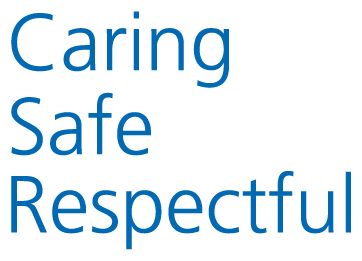Tilt table.
This leaflet provides information about your forthcoming appointment so that you know exactly what to expect. If you have any issues or concerns and would like to discuss this test before attending for your appointment please contact the Cardiac Investigations Unit on 01253 957736.
A tilt table test is designed to look at how your body responds to standing upright for a prolonged period. You may be referred for this test if you have had episodes of fainting, collapse or passing out with an unknown cause. The appointment usually lasts up to an hour and a half (90mins).
It aims to induce your symptoms in a controlled and safe environment where you can be monitored. The results may explain why you might be having these episodes and guide further treatment.
• On the day of the test, you must NOT eat or drink for four hours before your appointment.
• Take your medications as prescribed unless otherwise instructed.
• Wear a top that enables us to fit a blood pressure cuff to your upper arm and footwear you find comfortable to stand still in for lengthy periods of time
• You are advised not to drive after this test and will need to attend with a friend/relative or carer who can accompany you home.
• If you have a medical or physical condition - meaning you are unable to attend appointments without ambulance transport - please call patient transport services on 0800 323 240 well in advance to arrange this. Please ring Cardiac Investigations Unit to advise us that you are arriving by hospital transport.
• You may wish to bring a snack and drink to have after the test as you will have had nothing for 5-6 hours.
The Cardiac Physiologist performing your test will have a brief chat to confirm you wish to go ahead with the test, that you have had nothing to eat or drink for four hours and that it is safe to go ahead. You may ask questions at any time prior, to or during, your appointment.
At the beginning of the test, you will be asked to lie down on a couch with a footplate, which is the tilt table. Stickers (called electrodes) will be attached to your upper and lower torso. Two blood pressure cuffs will also be attached, one to your hand and another to your opposite upper arm. This equipment will be used to continuously monitor your heart rate, rhythm, and blood pressure throughout the test. You will be positioned onto the tilt table using fabric straps for your safety.
The table will tilt you upwards until you are practically standing upright on the footplate, whilst the Cardiac Physiologists in the room turn the lights down and sit quietly beside you. You will stay in this position for up to 45 minutes. You will be monitored throughout the test to see if there are any changes in your heart rate, rhythm, or blood pressure. You will be able to talk to the Cardiac Physiologists in the room during the test, for example if you start to feel unwell or wish to stop the test.
You may feel faint, collapse or pass out during the test. If this happens, the tilt table will immediately be brought back down, and we will raise your feet slightly so that they are higher than your head to enable you to recover quickly. At the end of the test the Physiologists will inform you that the test is over. They will carefully bring the table back to the starting position, so that you are lying flat again. You will then be unstrapped from the table and disconnected from the monitoring devices and be asked to wait in the waiting area until you have had a drink and feel recovered.
If the Physiologist has any concerns they may ask a doctor to review you before you leave.
As we are aiming to provoke your symptoms in a controlled environment, this test is performed regularly in our department and deemed safe; however you may experience your usual symptoms such as dizziness, feeling faint, sick or pass out. Most people find these symptoms pass quickly once the table is returned to the horizontal position. Some people may feel some residual side effects such as headache or fatigue; in this case you may wish to delay normal activities until the day after the test.
A report will be sent to the Health Care Professional who requested the test. You may be given the results during your next clinic appointment, by telephone or we may write to you. Queries regarding your results should be directed to the team who requested your test.



